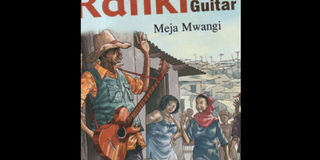Meja Mwangi’s latest volume tackles threatened masculinity

What is the common denominator between Rafiki, an out-of-job entertainer of the one-man guitarist kind, and the pair of clownish and near-bankrupt Indians Manu and Manish? Well, it’s the story of Nanyuki. PHOTO| FILE| NATION MEDIA GROUP
What you need to know:
Meja Mwangi is actually a household name Kenyan literary circles and his gems include Kill Me Quick, Going Down River Road, Carcase for Hounds, The Cockroach Dance and The Last Plague. Others are The Mzungu Boy, The Big Chiefs, The Boy Gift,
Mountain Of Bones and Bush Trackers, which has been turned into a movie.
Title: Rafiki Man Guitar
Author: Meja Mwangi
Publisher: Spear Books (an imprint of EAEP)
Price: Kshs 700
Pages: 330
Year of publication: 2015
Reviewer: Dunford Kagiri
What is the common denominator between Rafiki, an out-of-job entertainer of the one-man guitarist kind, and the pair of clownish and near-bankrupt Indians Manu and Manish? Well, it’s the story of Nanyuki.
In this tale, masculinity is threatened as women take more political and social visibility. Born and brought up in a tough inner city surburb in Nanyuki, Rafiki is in midlife crisis. Amidst domestic challenges, Rafiki’s fortunes have greatly waned.
He has had the best days behind him.
The demand for stand-up guitarists is waning. But instead of dwelling on the inevitable cascade into self pity, a theme that pervades Meja Mwangi’s latest novel, Rafiki Man Guitar, the protagonist reinvents himself as a debt collector for the hire purchase
operators Manu and Manish, a colourless pair also running away from their own monsters of subtle male subjugation and bleak financial prospects.
At his wits end, Rafiki actually attempts a heist at the pair’s shop. And from it he gets a morose and certainly unwelcome audience of the pair of Manu and Manish.
Meja Mwangi is actually a household name Kenyan literary circles and his gems include Kill Me Quick, Going Down River Road, Carcase for Hounds, The Cockroach Dance and The Last Plague. Others are The Mzungu Boy, The Big Chiefs, The Boy Gift, Mountain Of Bones and Bush Trackers, which has been turned into a movie.
And he doesn’t disappoint in Rafiki Man Guitar. He is at his debonair best, giving Rafiki Man Guitar the rustic aura that pervades many of his novels, yet tackling germane themes of honesty, male subjugation; helplessness and what devolved governments (nay power) means to rural folks.
Rafiki Man Guitar packs the usual suspense, twists and turns and immense subtlety in rendering human feelings and emotions that put Meja Mwangi in the stable of great writers; it is a book that you cannot put down easily once you start reading!
So, Rafiki and the pair of Manu and Manish meet under extraordinary circumstances and hatch a survival plan for all of them. Rafiki becomes their debt collector of the many home appliances that they have sold on hire purchase.
And Rafiki, who knows the Nanyuki terrain very well, and the local people’s psyche even better, could not have come at a better time. The fortunes of the pair of Manu and Manish are on the mend and Rafiki has a real job for once. But it’s not without
drama as his repossessing skills attract the attention of the local county officials.
In Rafiki’s frenzy to repossess unpaid appliances, or make their owners pay, or both, the story of Nanyuki’s genesis and the ethos of its various inner city quarters come to the fore poignantly.
Rafiki Man Guitar is a testament of failed urban planning and dashed hopes of slum development by successive generations of elected leaders. The author brings out the desolation, danger and joy of the downtrodden. The reader feels the languid ebb of life in any slum, the danger lurking in all inner cities and the treachery of the human spirit.
Yet despite his condition, Rafiki comes across as a vastly honest man. He is a moral beacon in the morass of a life of quick deals, cheap tricks and easy gains of the people that he is reminding to kula na kulipa, honour their obligations!
It is not only to slum dwellers that Rafiki takes this personal war but also a government functionary who (deliberately) fails to meet his hire purchase obligations! What a timely message, especially after the papal visit to Kenya.
By virtue of the myth that his repossessing skills spawn, Rafiki takes on the legend of the new sheriff in Nanyuki and its peri-urban environs. Buoyed by his rising star, Rafiki makes several attempts at mending fences with his estranged wife — a tough
woman. The author creates an almost omnipresent but hazy persona of Rafiki’s wife expertly to render the theme of the absent male figure in the family and women’s increasing social visibility.
Her sharp calls demanding this or that actually make her ghostly yet significant in his struggles.
At one of his boldest attempt at rapprochement with his wife, Rafiki takes the pair of his employers Manu and Manish along. He succeeds in meeting her, never mind that she had cleaned his house of everything, including the mattress, when running away, certainly in keeping with the tough mien of the people of Nanyuki that permeates the entire novel.
It’s not all gloom but Meja Mwangi intersperses some humour in this riveting tale. Like the pair of Manu and Manish, they of immense gestures and poses, and who think that women and banks are the same thing (in their demand for money) and keep on exclaiming all the time theek hei!
There is a boda boda wizard, Kata Kona, who takes his motor cycle to its limits and whom Rafiki owes a vast amount of unpaid fare money. To cap the incredulity, Rafiki’s son wants his box guitar so that he can revive his father’s old band!
Rafiki Man Guitar is a vastly refreshing book that is bound to be popular with all ardent readers of Meja Mwangi and other new ones as well.




